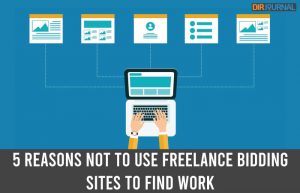


If you’re a freelancer, you’ve probably come across freelance bidding sites (also called freelance marketplaces) at some point in time. They’re sites that connect buyers to service providers. Buyers post gigs. Providers post profiles. When you see a gig advertised that appeals to you, you can make a bid, competing with the bids of other freelancers.
Many service providers swear by these sites. But they have many problems and in the majority of cases you could get much better gigs by staying away from them. Remember, running a serious freelance career isn’t just about landing gigs. It’s about landing the right gigs — the best gigs you can get that allow you to reach your goals and grow your business.
Here are five reasons I recommend staying away from freelance bidding sites especially if you’re new. Going to them early on can significantly set you back and the clips you get are often for very different markets than the ones you’ll ultimately want to target.
1. Increased opportunities are often outweighed by increased competition.
One of the most common reasons I hear freelancers give for using freelance bidding sites is that there are a lot of gigs all in one place. But that doesn’t account for a couple of important things like the quality of those jobs or the increased competition.
It doesn’t matter if more jobs are available publicly if you’ll have to compete with ten times the number of other contractors for every gig that looks interesting to you. Gigs landed through other means cut down on the competition greatly and even sometimes completely (like bringing prospects to your own professional site through search engine rankings or building an authority status that makes clients want to work with you, and only you).
2. High paying freelance gigs are usually not advertised publicly.
While you might occasionally find a really decent gig on bidding sites, those gigs are usually few and far between. There’s good reason for that. Prospects know that these sites are overpopulated with new and unqualified freelancers (whether they be writers, designers, or anything else). They’re seen as an easy place to get a start.
That’s not to say there are no professionals on these sites. The problem is that as soon as someone advertises a gig — on bidding sites, forums, job sites, or anywhere else — with a decent budget attached, the buyer gets bombarded with a lot of applications and enquiries from people who are not qualified for the job. People apply simply because there’s more money than they’re used to seeing advertised. It’s not worth a buyer’s time to sort through all of this when there are far more efficient ways of finding qualified professionals — search, referrals, and turning to contractors they have past relationships with.
Most of the really great freelance gigs aren’t advertised publicly, leading to the misconception that low rates like $10 per article or $100 for a full Web design are the industry norms. They’re not. You’re just looking at a client base that cares about price more than quality or that doesn’t know what real professional standards are for their projects. If you want those better gigs, your time is best spent elsewhere like building your professional website and using Internet marketing and SEO to improve its rankings or building a solid referral network.
3. You miss out on the branding benefits of marketing.
Marketing can do so much more than lead to your next gig. The marketing you do today could be bringing in new freelance gigs for years. That’s if you focus on platform building and gaining visibility and recognition in your specialty area. By doing those things you get branding benefits that carry with you for a long time.
People start to recognize your name or your work. They seek you out. They refer you to others. Building a solid brand image is one of the best things you can do when marketing freelance services. But you get very little branding benefit from the time you spend marketing if that time is spent on bidding sites. Why? Because it’s no longer about your personal brand. It’s about the bidding site’s brand. You become nothing more than yet another fish in a very large freelance pond.
4. You’ll find a lot of unrealistic demands and repeated ads.
Freelance bidding sites have become famous over the years for some of the absurd ads. Buyers often jump into their own businesses with no adequate financing, so they have little to no budget to work with. But they still expect you to be happy with the little bit they offer, and they expect far more than they have any right to expect from contractors in relation to what they’re willing to pay. Demands are high, but the value they place on your work (and therefore the respect they have for you as a professional) is low.
For example, you might see someone asking for 100 articles for a total of $100 and they want a two-week turnaround. And oh yeah, you have to be a native English speaker and have an engineering degree if you want the gig. Or they might want to pay that $100 for a five-page Web design from scratch, with two design options to choose from and less than a week’s turnaround time.
Professionals have spent time highlighting some of these ridiculous ads and their unrealistic demands for years now in an effort to enlighten newer freelancers. And it’s for good reason. Things haven’t changed in all that time. Cheap clients will almost always remain cheap clients, and they’re usually the most demanding clients to work with. Not only that, but these are often gigs with high turnover rates which means you can find the same gigs advertised over and over again. That artificially inflates the true number of advertised gigs you’ll find on these sites.
5. It’s never smart to market services solely or mostly on low prices — something freelance bidding sites often force you to do.
I’ve said this countless times to newer freelancers, but it’s worth repeating here. Any marketer worth their salt will tell you it’s never a smart idea to market freelance services solely or mostly on low prices. It’s downright silly. You cannot mass-produce your time to sell it for less. And that time is the real asset you’re selling. You have a limited number of hours each month that you can spend on client projects.
If you keep lowering rates to underbid other freelancers, you’ll eventually find yourself stuck in a rut that can be very difficult to climb out of. You need to determine the minimum hourly rate you can charge to meet your financial goals first. Then convert that into project rates if you prefer. Only then can you figure out what you should be bidding for gigs. And those rates should be the lowest you go. You shouldn’t bid lower just because others are. That devalues everything you bring to the table and it ultimately sets you up for failure. Any client worth having will hire you based on your credentials and past work; not based on the lowest bid they receive. Yet this “race to the bottom” mentality is exactly what freelance bidding sites promote.
There’s nothing wrong with testing out bidding sites and other methods for landing quality freelance gigs. But if you’re competent at what you do, you can do so much better. If you do insist on using bidding sites at least try to limit your time there so you can build a solid platform for yourself and your services at the same time. It’s not ideal (that would be seeking professional markets and building that platform more quickly early on), but it’s far better than being caught in a perpetual bidding war for gigs that usually aren’t worth it.
View Comments
I'm about to hunt for work on elance. I'm based in the United States and need some extra scratch. I've had good luck hiring people on that site, so I'm hoping I'll have good luck finding work. I'll admit, this article crushes my hopes.
If you are in US, go for Demand Studios instead. Much better!
I really hope that's meant to be a joke....
I've had some good contractors on Odesk and some bad ones. The interviewing process is very important. I tend to instantly reject those with no feedback or the lowest hourly rates but do, on occasion give some of these a chance.
Odesk contrators seem to be a little less expensive than, say, People Per Hour. We've had both good and extremely poor on each. It's always a risk. Work must be checked. Contractors come and go - we're always trying to develop long term working relationships but this sometimes doesn't happen. It's a matter of not putting all of your eggs into one basket and always working with a continguency plan.
On the buyer side, of course it's always a risk. But buyers using bidding sites can take a much bigger risk than those who find qualified freelancers themselves. That's because the most successful freelancers (those with a long track record of treating their clients well) don't use those bidding sites to find work as often as others. But that's a risk buyers take. If they want to be cheap, they run to "race to the bottom" marketplaces. When they want the best, they aren't as likely to find it there. They need to seek the right person for the job elsewhere (Google, asking for referrals, etc.). Then finding contractors for long-term relationships doesn't have to be as much of a challenge.
I use Elance and other sites to find work. It is important to stay true to yourself. If your time is worth $25/hour, then you need to bid that way. The jobs are out there, and good clients will pay for quality. You may not get every job, but you will get jobs where the client is interested in your style. Freelancing can be hard. Use all the tools available: your own website, many online websites that bring buyers and sellers together, use social media to promote yourself, and word of mouth will always bring you the best clients.